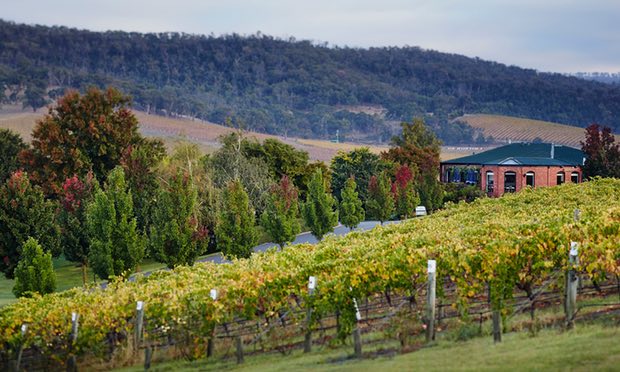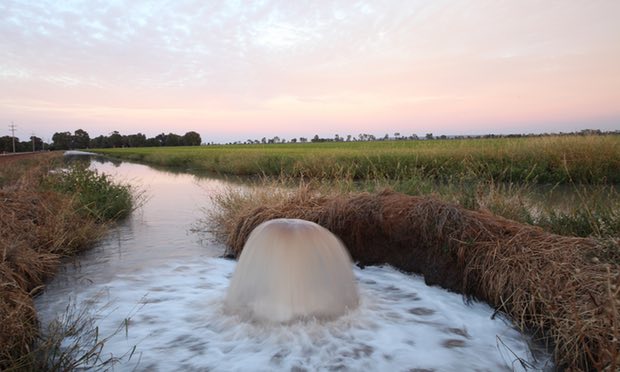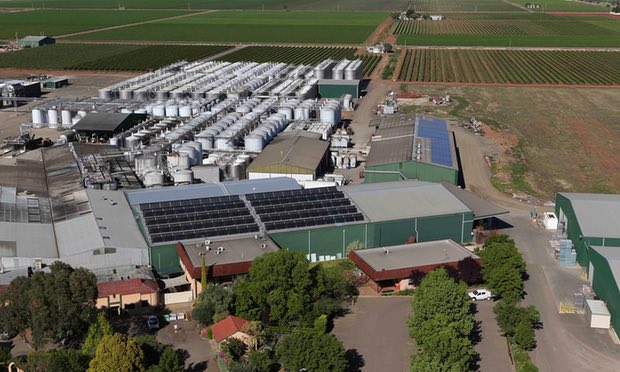Solar energy, no sodium and organic fertilizer: how one of Australia’s biggest wineries is reducing waste while saving money and energy.

One of Australia’s biggest family-owned wineries wants to become the country’s first zero-waste wine producer, and has invested more than $15m to achieve this goal.
De Bortoli Wines, which has wineries at four sites in two states, has already cut the amount of waste it disposes to landfill from 300 tonnes a year to 48 tonnes as part of a long-term sustainable business plan adopted in 2004.
This ambitious environmental management plan, which the company calls its carbon economy project, has resulted in the redesign of almost every aspect of production, from refrigeration, lighting and packaging to wine filtration pumps, compressors and composting systems for industrial waste such as grape skins, stems and seeds.
It has been a massive and meticulously planned undertaking for managing director and third generation winemaker Darren De Bortoli, and the company’s operations manager, Rob Glastonbury.
Although the company’s main winery is at Bilbul, a small Riverina town about six kilometres north-east of Griffith in southern New South Wales, it also owns two wineries in Victoria – in the Yarra Valley and the state’s north-east – and another at Pokolbin in the Hunter Valley in NSW.
That has meant coordinating industrial energy audits, feasibility studies and production trials across the four sites, each with differing regional climates that are reflected in localised variations in energy and water consumption.
De Bortoli says the family company’s commitment to sustainable business initiatives began with an application to the NSW Environment Protection Authority to expand the Bilbul winery.
“We had to prepare and submit an environmental assessment to the EPA as part of the expansion plan – that led to discussions about how we could improve production systems, do things differently,” he says.

The WFA has also introduced a set of policies covering water use, climate change, farm biodiversity and genetically modified organisms. The climate policy encourages members to “minimise greenhouse emissions across all stages of production” and urges federal and state governments to “adopt a consistent approach to greenhouse gas and climate change, including adaptation strategies.”
De Bortoli is also a Winemakers’ Federation of Australia (WFA) committee member, and was involved in developing the WFA’s environmental policies, which cover water us, climate change, farm biodiversity and genetically modified organisms. The WFA has played a critical role in shaping the industry’s approach to sustainability. In 2000 it launched a 10-year marketing strategy that urged growers to preserve the reputation of Australia’s wines through “environmental policies which manage salinity, pollution and urban encroachment”.
De Bortoli also says he gave the former prime minister Tony Abbott “quite an earful” about Murray Darling basin water reform measures, and the need to “revisit some of the policies around groundwater extraction” and salinity.
The De Bortoli company became a founding member of the Australian Wine Research Institute’s environmental assurance program, Entwine. It’s a voluntary certification audit that sets environmental standards for a list of “business metrics” that include winery wastewater management, carbon emissions and use of synthetic refrigerants.
Glastonbury says environmental certification doesn’t automatically “get more dollars, but it certainly opens more doors” in both global and domestic markets. “For many of our customers, unless you can tick that clean and green box, forget it. There’s an RSL club on the north coast of New South Wales, and they want to see environmental certification before they start placing orders,” he says.
Glastonbury says one of the most important, and early, environmentally inspired decisions for the company was to eliminate all sodium-based chemicals used in production and cleaning because of concerns about increasing levels of soil salinity across the Murray-Darling Basin. “It was Darren’s decision, and it was a revolution – a huge change – because it meant we could reuse our waste water. It changed the industrial ecology of the business,” Glastonbury says.
De Bortoli says his decision to eliminate sodium was inevitable and “a no-brainer.” “It was good sense and good science. We’re a business that’s operating in the Murray-Darling Basin and that means we’ve got to look at ways we can tackle regional issues like salinity and water efficiency.”
The company switched to potassium-based cleaning agents, which means the effluent contains potash, commonly used as an agricultural fertiliser. Prior to the decision to go no-sodium, the winery’s wastewater was stored in large holding dams to allow oxygen to break down organic matter, and then transferred to evaporation basins.
The waste water from the Bilbul winery is now used to irrigate grain and fodder crops on a neighbouring farm owned by the De Bortoli family, and the sale of these crops offsets the costs of wastewater management at the winery. Glastonbury says the company installed a new low-energy wastewater treatment plant at Bilbul, which has cut electricity costs by about $200,000 a year.
At the Yarra Valley winery, an aerobic biotreatment plant is used to filter and recycle wastewater. It’s the largest vineyard in Australia using biological viticulture techniques based on sustainable soil management practices advocated by US soil microbiologist Dr Elaine Ingham to improve water retention and soil health.
The winery has also introduced a composting system that uses waste windrows, or rows of compost heaps, to produce organic fertiliser for the vineyards. Other environmental initiatives at Yarra Valley include planting habitat and food trees for wildlife and brewing vats of compost tea using rainwater harvested onsite.

Glastonbury says the sustainability master plan for the four wineries aims to improve energy and water efficiency, minimise waste and cut carbon emissions while also cutting production costs.
One of the complex, long-term sustainability challenges is developing a smoother, more continuous “one shot” production system that will create further energy savings. The company is working with scientists from the University of Technology Sydney, who are studying the properties of wine particles to identify ways to minimise processing requirements.
In 2013, the company installed the Australian wine industry’s biggest solar panel array at its Bilbul winery, and De Bortoli jokes that the system “pumps out so much electricity that we’re now registered as a power station”. The solar array supplements power from the grid, and has cut the company’s carbon emissions by more than 314 tonnes a year.
Their efforts have been recognised and supported by the NSW government’s sustainable advantage program, and won an Australian Business award for Sustainability in 2015. The bottom line is, of course, whether the company’s carbon economy project delivers significant savings and return on investment.
Glastonbury estimates that redesigning the winery’s aeration system has reduced power requirements “from 400 kW hours to eight, which saves us over $240,000 a year”. Return on investment is currently at about 20% over five years, and the company has cut its carbon emissions by more than 2,500 tonnes of CO2 equivalent a year.
What’s next? De Bortoli says there are new challenges in improving cross-flow filtration methods and reducing sediments in the waste stream. “The road to becoming a sustainable business is a long and interesting one,” he says.



 0
0